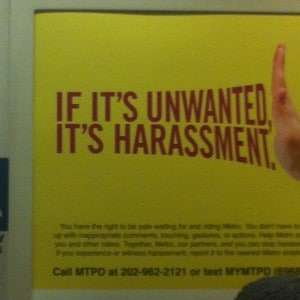The Volokh Conspiracy
Mostly law professors | Sometimes contrarian | Often libertarian | Always independent
Heckler's veto, anyone?

Riders of the D.C. Metro will recognize the above poster, which appears on the side of Metro cars and on the walls of Metro stations. The text - hard to make out in the photo I snapped - reads:
"You have the right to be safe waiting for and riding Metro. You don't have to put up with inappropriate comments, touching, gestures, or actions. Help Metro protect you and other passengers. If you witness or experience harassment, report it to the nearest Metro employee."
One shouldn't, I suppose, make too much of this. Everyone should indeed feel safe riding Metro, and I don't have any problem with reminding passengers that they can, and should, tell a Metro employee if they see or experience anything they regard as "inappropriate."
But it's just not correct to say that anything that is "unwanted" is "harassment," and I would greatly prefer it if Metro would not use any part of my fees to suggest that it is. It's certainly not correct as a technical, legal matter; not all inappropriate, unwanted, offensive or objectionable comments or conduct is actionable "harassment" - nor could it be, constitutionally. "No Yankees hats on my Metro, damn it!" may be a very strongly held view - but you are not, in any sense of the term, "harassing" me when you violate it.
And there does seem to be a growing feeling across the land that everyone is somehow entitled to live in a world where nothing offends them - from Halloween costumes to the names of sports stadiums. Hey, if it's unwanted, it's harassment, and nobody is in favor of harassment, right?


Show Comments (0)